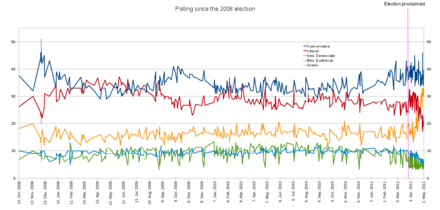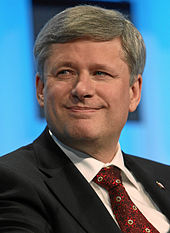2011 Canadian General Election
The 41st Canadian general election ( English 41st Canadian General Election , French 41e élection fédérale canadienne ) was held on May 2, 2011th 308 members of the Canadian House of Commons (English House of Commons , French Chambre des Communes ) were elected. This election became necessary because Prime Minister Stephen Harper's minority Conservative Party government lost a vote of no confidence on March 25, 2011 . The Conservatives, who had ruled with a minority since 2006, received an absolute majority of the seats for the first time since their re-establishment.
background
The 2008 general election brought only minor changes and resulted in the continuation of the minority government of the Conservative Party, led by Prime Minister Stephen Harper . The subsequent legislative period was marked by two controversial adjournments of parliament (in the country's parliamentary process, the governor-general usually orders an adjournment if the objectives set in the speech from the throne are considered to have been achieved; the suspended parliamentary operations are then resumed with the next speech from the throne).
At Harper's request, Governor General Michaëlle Jean granted an adjournment until January 26, 2009 on December 4, 2008. The government justified this step with the need to take more time to prepare a new economic program. The opposition, however, saw it merely as an attempt to forestall a vote of no confidence requested on November 27 . The second controversial adjournment took place on December 30, 2009, when Harper asked the Governor General to suspend parliamentary operations until March 3, 2010, justifying this in turn with the preparation of an economic program. Opposition representatives described this measure as a disdain for democratic institutions and accused the government of simply trying to evade uncomfortable questions about the deployment of Canadian troops in Afghanistan . As a result, demonstrations against the "closing of democracy" took place in various Canadian cities.
In February 2011, the electoral authority Elections Canada accused the Conservative Party of exceeding the legally limited campaign expenses by more than one million dollars in the 2006 general election and of concealing the additional expenses. After a parliamentary commission of inquiry came to the conclusion that Harper's government had withheld or withheld important information from parliament in several cases, the opposition parties refused to approve the budget. In response , the Liberal Party requested a vote of no confidence , which was successful on March 25, 2011 with 156 votes to 145.
Opinion polls
During the entire legislative period since the general election in 2008, there had been relatively little fluctuation in opinion polls . Even in the first three weeks of the campaign, no major changes appeared to be on the horizon. The situation changed markedly when the New Democratic Party caught up with the Liberals in the polls in mid-April 2011 and how they came to a share of 25%.
In the following two weeks, the increasing support for the social democratic NDP was particularly evident in the province of Québec . After being only the fourth-strongest party there in 2008, it now took the lead and also overtook the party with the largest number of voters to date, the separatist Bloc Québécois . In the other provinces, too, the NDP was able to record rising approval rates, leaving the liberals behind nationwide and significantly narrowing the gap to the conservatives.
Effects
The Conservatives grew slightly, adding 23 seats. Stephen Harper was confirmed as head of government and was now able to rule with a narrow majority of the seats instead of as head of a minority government. The New Democratic Party achieved its best result in its history, thanks in large part to an outstanding performance in the province of Québec, where the party had only won a seat twice since it was founded. The increase in their share of the vote by 12.5 percentage points resulted in a tripling of the previous number of seats and Jack Layton became the first NDP chairman to take over the position of opposition leader.
The Liberal Party collapsed significantly and achieved by far the worst result in its history. The separatist Bloc Québécois, which had always won a majority of the seats in Québec in the previous six general election, suffered a severe defeat and only won four seats. Michael Ignatieff and Gilles Duceppe , the leaders of the Liberals and the Bloc Québécois, respectively, were both defeated in their constituencies and resigned. For the first time, the Greens won a seat in the House of Commons, with their chairman Elizabeth May .
Results
Source: Elections Canada
Overall result
| Political party | Chairman | candidates data |
Seats 2008 |
upon dissolution |
Seats 2011 |
+/- | be right | proportion of | +/- | |
|---|---|---|---|---|---|---|---|---|---|---|
| Conservative Party | Stephen Harper | 307 | 143 | 143 | 166 | + 23 | 5,832,401 | 39.62% | + 1.99% | |
| New Democratic Party | Jack Layton | 308 | 37 | 36 | 103 | + 66 | 4,508,474 | 30.62% | + 12.49% | |
| Liberal Party | Michael Ignatieff | 308 | 77 | 77 | 34 | - 43 | 2,783,175 | 18.91% | - 7.31% | |
| Bloc Québécois | Gilles Duceppe | 75 | 49 | 47 | 4th | - 45 | 889.788 | 6.05% | - 3.92% | |
| Green party | Elizabeth May | 304 | 1 | + 1 | 576.221 | 3.91% | - 2.89% | |||
| Independent / non-partisan | 61 | 2 | 2 | - 2nd | 72,731 | 0.49% | - 0.28% | |||
| Christian Heritage | James Hnatiuk | 46 | 19,218 | 0.13% | - 0.06% | |||||
| Marxist-Leninists | Anna Di Carlo | 70 | 10.160 | 0.07% | - 0.01% | |||||
| Libertarian party | Dennis Young | 23 | 6,017 | 0.04% | - 0.01% | |||||
| Progressive Canadian Party | Sinclair Stevens | 9 | 5,838 | 0.04% | ||||||
| Rhinoceros | François Gourd | 14th | 3,819 | 0.03% | + 0.01% | |||||
| Pirate party | Mikkel Paulson | 10 | 3,198 | 0.02% | + 0.02% | |||||
| Communist Party | Miguel Figueroa | 20th | 2,925 | 0.02% | - 0.01% | |||||
| Canadian Action Party | Christopher Porter | 12 | 2,030 | 0.01% | - 0.01% | |||||
| Marijuana party | Blair Longley | 5 | 1,864 | 0.01% | - 0.01% | |||||
| Animal Alliance | Liz White | 7th | 1,451 | 0.01% | + 0.01% | |||||
| Western block party | Doug Christie | 4th | 748 | > 0.01% | ||||||
| United Party | Brian Jedan | 3 | 294 | > 0.01% | ||||||
| First Peoples National Party | Will Morin | 1 | 228 | > 0.01% | ||||||
| vacant | 3 | |||||||||
| total | 1,587 | 308 | 308 | 308 | 14,720,580 | 100.0% | ||||
Result by provinces and territories
| Political party | BC | FROM | SK | MB | ON | QC | NB | NS | PE | NL | NU | NT | YT | total | ||
|---|---|---|---|---|---|---|---|---|---|---|---|---|---|---|---|---|
| Conservative Party | Seats | 21st | 27 | 13 | 11 | 73 | 5 | 8th | 4th | 1 | 1 | 1 | 1 | 166 | ||
| Percentage ownership % | 45.5 | 66.8 | 56.3 | 53.5 | 44.4 | 16.5 | 43.9 | 36.7 | 41.2 | 28.4 | 49.9 | 32.1 | 33.8 | 39.6 | ||
| New Democratic Party | Seats | 12 | 1 | 2 | 22nd | 59 | 1 | 3 | 2 | 1 | 103 | |||||
| Percentage ownership % | 32.5 | 16.8 | 32.3 | 25.8 | 25.6 | 42.9 | 29.8 | 30.3 | 15.4 | 32.6 | 19.4 | 45.8 | 14.4 | 30.6 | ||
| Liberal Party | Seats | 2 | 1 | 1 | 11 | 7th | 1 | 4th | 3 | 4th | 34 | |||||
| Percentage ownership % | 13.4 | 9.3 | 8.6 | 16.6 | 25.3 | 14.2 | 22.6 | 28.9 | 40.1 | 37.9 | 28.6 | 18.4 | 32.3 | 18.9 | ||
| Bloc Québécois | Seats | 4th | 4th | |||||||||||||
| Percentage ownership % | 23.4 | 6.1 | ||||||||||||||
| Green party | Seats | 1 | 1 | |||||||||||||
| Percentage ownership % | 7.7 | 5.3 | 2.7 | 3.6 | 3.8 | 2.1 | 3.2 | 4.0 | 2.4 | 0.9 | 2.1 | 3.1 | 18.9 | 3.9 | ||
| Independent | Percentage ownership % | 0.2 | 1.3 | 0.2 | 0.1 | 0.2 | 0.6 | 0.5 | 0.3 | 0.4 | ||||||
Web links
- Elections Canada (Electoral Authority)
See also
Footnotes
- ^ GG agrees to suspend Parliament until January. CBC News, December 4, 2008, accessed April 30, 2011 .
- ↑ Prime Minister Harper rules without a parliament. Handelsblatt , January 6, 2010, accessed April 30, 2011 .
- ↑ Thousands turn out at rallies to protest proroguing of Parliament. The Gazette , January 24, 2010, accessed April 30, 2011 .
- ↑ Tory election allegations 'illegal' not administrative, prosecutor says. The Globe and Mail , February 28, 2011, accessed April 30, 2011 .
- ↑ Harper government falls in historic Commons showdown. The Globe and Mail, March 25, 2011, accessed April 30, 2011 .
- ^ NDP moves into tie with Liberals. Toronto Star , April 18, 2011, accessed April 30, 2011 .
- ↑ 'Terra incognita': Poll projects 100 seats for surging NDP. The Globe and Mail, April 25, 2011, accessed April 30, 2011 .
- ↑ General Election - May 2, 2011. Elections Canada, March 17, 2014, accessed September 11, 2015 .





